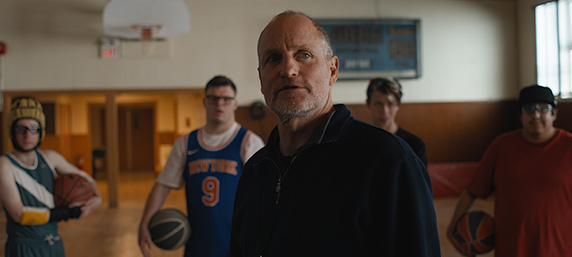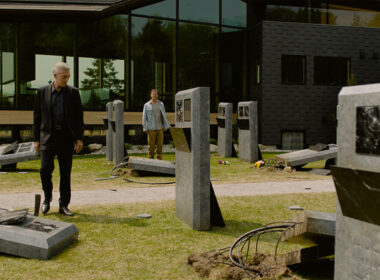The Law Society and Transmission Films have 10 double passes to offer for the upcoming British drama Living.
Set in 1950s London, LIVING is about a humourless civil servant who decides to take time off work to experience life after receiving a grim diagnosis. The film is a critically acclaimed reimagine of the Japanese classic “Ikiru”, receiving many 5 star reviews, and has 2 Oscar nominations ; including Best Adapted Screenplay and Best Actor in a Leading Role for Bill Nighy. You can watch the trailer here.
For a chance to win one of the double passes, email your LAWID number and address to journal@lawsociety.com.au with the subject line “Living”
To Leslie
The past can be such a disappointing mistake. To Leslie starts with a recording from a news broadcast in West Texas. Leslie (Andrea Riseborough) just won a local lottery and is being interviewed, unable to contain her happiness. She brings her son into the interview, telling the camera that she’ll be buying him a guitar, and that a house makes things better.
A decade later, Leslie is evicted from her motel room with nothing to her name but a pink suitcase. In Magnolia, Paul Thomas Anderson said, “we may be through with the past, but the past ain’t through with us.” Sometimes that’s not true. Sometimes the past is done with our b******t.
The only choice for Leslie is to be with her son, James (Owen Teague). He has an honest job and a quiet life. Leslie has been an estranged mother, consumed by severe alcoholism. I like the way James is portrayed as precisely her opposite: he’s a reaction to his mother’s irresponsible lifestyle. She promises him she’s changed, that she’s sober now, and needs only to find her feet again.
Leslie quickly falls off the wagon as expected; I doubt she ever intended to remain on it. But it’s still a deeply sad moment. You feel for James, for whom his mother’s presence is both a blessing and a curse — there is trauma he’s trying to avoid, but he loves her too much not to give it a try. And you feel for Leslie, a woman with a lot of love in her, whose downfall is systemic. The film shows acute awareness that her condition is a disease, not a bad character.
The film is divided into three parts, each set in a different place, as Leslie, rather than trying to find stability, is seeing how far she can get to before she dies on the side of the road. After leaving James, she finds refuge with her friend Nancy (Allison Jenney) back in her hometown. Nancy is a dose of hard reality Leslie doesn’t need right now. It’s that aspect of “you are your own responsibility” US culture that judges you at the same time as it bullies you. It’s too much for Leslie. And she finds it too easy to fall back into the old ways.
The last, longer section sees Leslie helped by two motel owners, Sweeney (Marc Maron) and Royal (Andre Royo). Sweeney feels guilty for taking Leslie’s pink suitcase, and he offers her a job and a place to stay. At that point, she’s not even trying to make any amends, but is just a shell of a human who has quit on life. Sweeney has no responsibility for her, but, in a moment of heartbreaking humanism, his disappointment reaches Leslie, and this offers her a final chance at redemption.
It would be easy to make To Leslie another patronising, sad tale of substance abuse, broken families and lack of personal responsibility. US culture seems to excel at the idea that poverty is one’s own fault. But director Michael Morris and writer Ryan Binaco care too much about their characters to look down on them. The final act is an easy and expected resolution that’s highly improbable in today’s setting of rampant, unmoderated capitalism. Still, I understand the urge to give the characters some peace, even if this could happen only in a film.
The standout is Riseborough. There’s a useless controversy about her nomination for best actress to the Academy Awards since To Leslie is a modest independent film that many people wouldn’t have seen. And you just need two minutes of viewing to dispel any doubts that not only does Riseborough deserve to be included in the nominees, but it also wouldn’t be outlandish if she won. She pours out her heart and pours out sweat in an intense and measured way. I rarely felt that she was chewing the scenery.
If there is a problem with To Leslie, it’s the way the script avoids referencing the structural and economic issues that led to Leslie’s tragedy. There are only hints of the idea, but these are quickly brushed off lest it has to be admitted that America’s system is broken. The film needs hope, but society offers none.
Watching this film reminded me of the expression “pick yourself up by the bootstraps, ” which today means trying to better yourself. But think about it: if you lift yourself by the bootstraps, you will find you can’t move. In its origins, the expression is sarcastic, it means you’re being set an impossible task. To Leslie is inspired by the real story of Bianco’s mother, but with a different outcome. The real Leslie found the bootstraps didn’t lift her up.
Verdict: 4 out of 5
For everyone in need of an excellent, intense redemption drama. A good film needs a heart in the right place, and this one has it. And for a standout star there’s Andrea Riseborough.

Champions
Stop me if you have heard this before. Disgraced single middle-aged teacher/coach/instructor who never lived up to his potential loses his job, gets into trouble with the law and is forced to teach/coach/instruct a group of misfits/kids with disabilities/poor kids. After neglecting his new role, he starts caring for his pupils again, finds love, and discovers the most important thing in life is not money/reputation/fame but friendship.
In this case, it’s Marcus (Woody Harrelson), who was going to be a great NBA coach but first lost his job in a minor league and then, inebriated, collided with a police car. So the court orders him to do 90 days of community service coaching a team of kids with intellectual disabilities. “What do I call them if not the r-word?” he asks the judge. “Try calling them by their name”, she replies. Boom, mic drop.
Marcus starts caring for his team, and especially for Alex (Kaitlin Olsen), the sister of one of his players. Every beat in this film is predictable. The question is whether any of it is charming.
Champions is a generic drama that feels as if it’s come straight from 2002. Watching it on the big screen left me with a grin, just for the nostalgia of seeing a film like this in the cinema again. It has the energy of a studio film that’s filling a hole in the schedule before the studio’s big blockbuster release. There’s the solid production value of an easy-to-digest script. It’s an A-lister obviously having fun. I’m not going to lie — the first half of the film makes for comfortable viewing. This would be direct-to-stream fodder nowadays, so I admire them for having the guts to release the film as if in the old days of the cinema, and give it to Bobby Farrelly, a filmmaker who, with his brother, has perfected this genre to a T. The man rewrote the rule book, whether we liked it or not.
Unfortunately, Champions is the laziest release I’ve seen in a long time.
I say ‘release’ here because this is what it is. Most cynically, Champions exists only to be released not as a film, not as a piece of entertainment, but purely as a business decision. And that’s unfair for the actors, especially the kids having so much fun in this film it’s almost contagious. The script doesn’t give much to its characters apart from each kid’s little quirks, but the actors are all so good they manage to flesh out their roles with charisma. This is not School of Rock; it’s not even Bad News Bears.
The first half works fine. It’s a quick set-up before you get to the story’s meat and bones. Harrelson is in autopilot mode, and I suspect he was miscast in the role — he gets the unfriendly and acerbic side of the character but not the warmth. Olsen brings much more to her role.
The problem here is Farrelly and his writer Mark Rizzo. The film is based on a lovely Spanish film that gave it all, heart and soul. The original was a tremendous success in Spanish-speaking countries. The American remake cuts too many corners and dilutes and whitewashes some of the edges of the original, with the intention of pleasing a wider audience. I suspect it will fail. The Spanish film was nominated for 11 Goyas (the Spanish Academy Awards), winning three, including Best Film. I doubt the remake will get similar accolades.
When you write a script you start with the treatment. It’s usually five to ten pages that tell the film’s whole story. It’s an easy way to convince the producers to pay you to flesh the entire story out into a filmable 90-minute picture. From here, a development team decides which scenes must be added, removed or improved. If the final script is well done, it will differ from the initial treatment.
Champions looks like what we get is what was first written: that someone read those first ten pages and sent a note saying, “good enough”.
The best they could offer was meeting Olsen and the kids at their level. The film is theirs: at least some of it is worth it.
Verdict: 1 out of 5
The actors deserved more than this lazy attempt at cashing in on a successful formula. I wanted to celebrate being able to see a film like this back on the big screen. But there was no cause to celebrate.




